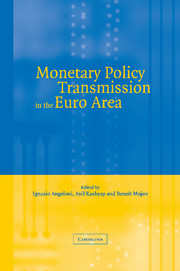 Monetary Policy Transmission in the Euro Area
Monetary Policy Transmission in the Euro Area Book contents
- Frontmatter
- Contents
- List of contributors
- Foreword by O. Issing
- Acknowledgements
- List of abbreviations
- Introduction
- Part 1 Macroeconometric evidence on the transmission mechanism in the euro area
- Part 2 Firms' investment and monetary policy: evidence from microeconomic data
- Part 3 The role of banks in the transmission: evidence from microeconomic data
- Part 4 Monetary policy in the euro area: summary and discussion of the main findings
- Appendix
- References
- List of figures
- List of tables
- Subject index
- Author index
Part 3 - The role of banks in the transmission: evidence from microeconomic data
Published online by Cambridge University Press: 22 September 2009
- Frontmatter
- Contents
- List of contributors
- Foreword by O. Issing
- Acknowledgements
- List of abbreviations
- Introduction
- Part 1 Macroeconometric evidence on the transmission mechanism in the euro area
- Part 2 Firms' investment and monetary policy: evidence from microeconomic data
- Part 3 The role of banks in the transmission: evidence from microeconomic data
- Part 4 Monetary policy in the euro area: summary and discussion of the main findings
- Appendix
- References
- List of figures
- List of tables
- Subject index
- Author index
Summary
The chapters in part 2 have shown that liquidity factors are likely to play a role in the investment decisions of firms in a number of euro area countries, in addition to interest rates and the cost of capital. This suggests that financial conditions may matter in the transmission of monetary policy. Banks, which occupy a central position in the euro area's financial system, are a natural focus of attention here. The chapters that follow contain a summary of evidence of the impact of monetary policy on the lending behaviour of banks. An opening summary chapter by M. Ehrmann, L. Gambacorta, J. Martínez-Pagés, P. Sevestre and A. Worms (chapter 14), brings together the evidence for the euro area, followed by more specific studies on Germany, Spain, France, Greece, Italy, the Netherlands, Austria, Portugal and Finland.
The vast international literature on the role of banks in monetary policy transmission in recent years has yielded a number of conclusions. First, there seems to be conclusive evidence that changes in policy-driven interest rates are followed by significant adjustments in bank balance sheets. Bank lending normally tends to contract after a montary policy restriction. Likewise, the most liquid components of bank liabilities (such as checking and demand deposits) also tend to fall with some lag. The effect on total deposits is more uncertain, as some redistribution takes place towards longer-term deposits.
- Type
- Chapter
- Information
- Monetary Policy Transmission in the Euro AreaA Study by the Eurosystem Monetary Transmission Network, pp. 233 - 234Publisher: Cambridge University PressPrint publication year: 2003


